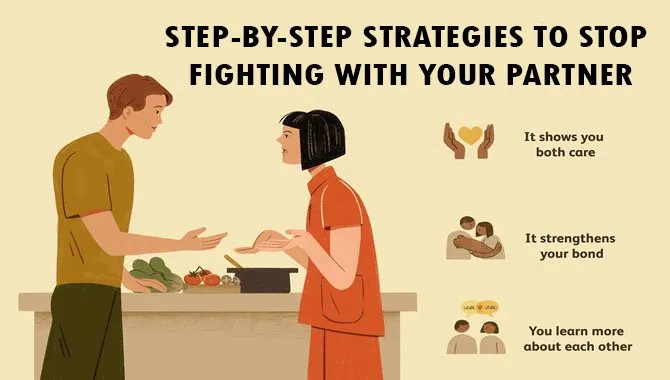Fighting is never a good thing; it can take its toll on your relationship. In this article, we’ll provide you with various strategies to help you stop fighting with your partner.
From identifying the root cause of anger to making compromises, these strategies will help you turn things around for the better. So, if fighting keeps you from living a healthy and fulfilling relationship, read on and start implementing these steps today.

5 Simple Steps Strategies To Stop Fighting With Your Partner

Bickering and fussing with your partner are common problems that can lead to lots of stress and tension. It can be frustrating when you’re trying to have a peaceful evening with them, only to have them start arguing again. You must take some simple steps to stop bickering and fussing with your partner. Here are five of the best:
1. Talk About What’s Happening.

If you’re not talking to your partner about what’s happening, you’re probably arguing and fighting with them. This isn’t healthy for either of you, and it’s difficult to resolve conflicts when communication is limited. The best way to start talking to each other is by identifying the issues causing conflict.
Once you know the root of the problem, you can work on a solution together. The key here is communication, both verbal and nonverbal. Talk about your feelings and why things are bothering you, even if you don’t feel comfortable admitting them aloud. This will help build trust between you and allow for constructive conversation instead of bickering and fighting.
2. Set Boundaries.
One of the best ways to stop bickering and fussing with your partner is to set boundaries. This means setting limits on how much interaction you have with them and when you’re allowed to speak. When communicating with your partner, it’s important to be clear and direct. Make sure that what you say is accurate, relevant, and phrased so that they will understand.
Be respectful of their feelings and avoid attacking or criticizing them unnecessarily. If you get heated up often, it may be helpful to take a break until things calm down again. Sometimes, it takes some time away from each other for things to start feeling more manageable again.
3. Agree To Disagree.

It can be frustrating when one partner continuously bickers and fusses with the other. If you’re getting drawn into this type of dynamic, there are some strategies you can try to stop it from happening. The first step is to recognize that this kind of behavior is usually a sign that you’re upset or frustrated.
Feeling these emotions makes it difficult to remain rational and reasonable, which is why your partner tends to get the best of you.
The next step is to try and voice your concerns calmly and reasonably. This will help prevent your partner from taking offense and reacting negatively. Finally, it’s important to remember that disagreements don’t have to mean conflict or hostility.
Most times can resolve them by working together constructively. If you approach your disagreements with an open mind and willingness to listen, chances are good that you’ll be able to resolve them successfully.
4. Let Go Of The Past.

If you want to stop bickering and fussing with your partner, you need to start forgiving and forgetting the past. It’s important to remember that the person who wronged you in the past is no longer in control, and you shouldn’t hold them responsible for everything that goes wrong between you two today. Instead of dwelling on what hurt you in the past, focus on creating a positive future together.
This means finding ways to compromise and work together harmoniously towards common goals. You should also try not to take things personally – after all, it’s not their fault that they do or don’t do something. If they make a mistake, forgive them quickly and move on. If you can start forgiving and forgetting the past, your relationship will be much healthier overall.
5. Seek Help If Needed.

If you’re struggling to deal with bickering and fussing with your partner, you can do a few things. First, get help from a professional. They may be able to provide you with some advice on how to deal with the issue or even offer support during the process. Another option is to try mediation. This is a process where people involved in an argument (usually couples) come together and try to resolve the issue without violence or confrontation.
Though it may not always work out, it’s often an effective way of resolving disagreements peacefully and without tension. Finally, if all else fails, you could consider discussing the problem openly and honestly with your partner. This will likely help them understand why you’re struggling and hopefully lead to a resolution you can agree on.
Identify The Root Cause Of Your Partner’s Anger.

There’s no doubt that bickering and fussing with your partner can lead to a lot of tension and conflict. To stop this from happening, you need to identify the root cause of your partner’s anger. The root cause of anger often lies in something that’s been unresolved for a long time. This can be anything from childhood issues to big disagreements that have taken place recently.
Once you know the root cause, you can start working on resolving it as quickly as possible so that the anger doesn’t continue to build up inside your partner. If you’re struggling to resolve an issue with your partner, it may be helpful to speak to a counselor or therapist who can help you work through these difficult problems together.
Build Trust Between You And Your Partner

One of the key ways to stop bickering and fussing with your partner is to build trust between you and them. Can do this by taking simple steps, like communicating, being honest, and setting clear boundaries. When you communicate with your partner, ensure you’re not speaking in circles or using vague language. Everyone must understand what’s going on, both implicitly and explicitly.
When you’re being honest with each other, be sure to be specific without being negative. This will help build trust in your relationship by clarifying that you are working towards the same goal of protecting and strengthening your relationship. Finally, it’s important to set boundaries so that each of you knows where the line is drawn.
This way, no matter how disagreements or problems arise, they won’t get out of hand because one person feels overwhelmed or uncomfortable addressing them head-on.
Dealing Effectively With Anger And Resentment

There are many different ways to deal with anger and resentment, but the best way to find out is to try a few different strategies and see which ones work best for you. Some of the most common strategies include:
Talking it Out is probably the most common strategy couples use. The goal is to have a conversation about what’s wrong and then try to resolve the issue as quickly as possible. If talking doesn’t work, the next step is to try mediation or arbitration.
Comparing Notes: Another strategy used in couples is comparing notes about what went wrong. This allows both parties to clearly understand what happened and why it got so heated. It can also help them figure out better ways to handle similar situations in the future.
Accepting Responsibility: Sometimes, when one person gets angry or resentful, they start pointing fingers instead of taking ownership of their feelings. Instead of blaming each other, it can be helpful for one partner to accept full responsibility for their own emotions and actions. This way, they can learn from their mistakes and move on more positively.
Communication Breakthroughs: Finally, if all else fails, communication breakthroughs may be necessary in order not only to resolve an issue but also to build trust between partners again. These are moments when both people open up about what’s happening in their heads and let the other person know they’re listening. This can help to repair relationships quickly and effectively.
How To Create A Healthy Relationship With Your Partner

A healthy relationship is based on compromise and understanding each other’s needs. Here are a few tips to help you create a healthy relationship with your partner:
Be honest with each other from the start. This will help build trust, and you’ll be able to address any problems head-on without fear of hiding things or lying. Talk openly about your feelings, both good and bad. This will allow you to understand each other better and work together toward resolving conflicts constructively.
Set boundaries that protect both of your interests. This means setting limits on how much time you spend with certain people, what you say to each other, etc. When these boundaries are respected, it builds trust and leads to healthier relationships overall. Let go of grudges and resentment. Holding onto these negative emotions only hurts you in the long run, as they breed bitterness and anger, which can eventually destroy the relationship altogether.
Listen To Your Partner And Try To Understand Their Point Of View.

It can be hard to deal with disagreements when you and your partner have different opinions. But, the best way to overcome this difficulty is to listen to what your partner says and try to understand their point of view. Try not to react immediately. This will only make the situation worse. Instead, take a few minutes to calm down and think about what you should say next.
Once you’ve come up with a response, make sure it’s reasonable and based on facts. If it isn’t, then reconsider whether your argument is worth continuing. Finally, remember that partners are supposed to fight each other sometimes. It’s how we learn and grow. So don’t feel guilty if arguments happen from time to time. Just try your best not to take them too personally and remember that they’re just a part of marriage.
Conclusion
Fighting with your partner is a common problem that can negatively affect your relationships. By following the simple steps outlined in this article, you can improve your relationship. It takes time and effort, but with the help of these strategies, you can finally put an end to the fighting.
Frequently Asked Questions:
1. What Are Some Common Causes Of Quarrels And Fights Between Couples?
Ans: There are a few common causes of quarrels and fights between couples. One of the most common reasons is when one partner takes things too seriously and doesn’t let go. Another reason is when partners do not give each other enough space and time to themselves.
Lastly, when emotions run high, there’s often a lack of communication between the couple, which leads to misunderstandings and tension.
2. What Can We Do To Resolve Disagreements Without Resorting To Arguing?
Ans: One of the best things you can do to resolve disagreements without arguing is to have a dialogue. Start by acknowledging what’s going on and finding where each person stands. Next, try and come up with solutions that both of you can agree on.
If neither solution seems feasible or possible, then it may be time for one or both of you to walk away from the situation. Remember that communication is key in any relationship, so don’t give up hope too soon.
3. Can Mindfulness Training Help Us Change Our Relationship Habits For The Better?
Ans: There is evidence that mindfulness can help us improve our relationship habits. Mindfulness can help us become more aware of our thoughts and feelings, which allows us to change our reactions to relationships. You can do different types of mindfulness training with your partners, such as skill practice, Vipassana, or body-sensation practice.
4. How Can I Set Boundaries With My Partner Without Arguing Or Fussing?
Ans: There’s no easy answer to setting boundaries with your partner without arguing or fussing. However, the following tips may help: Make a list of your expectations for the relationship and communicate these clearly and concisely. Be honest with each other and be open about your thoughts and feelings – this will help reduce misunderstandings.
Avoid using sarcasm or judgmental language when communicating. It will only lead to tension. Use logical arguments whenever possible rather than emotional appeals. This is more likely to persuade your partner.
5. What Can I Do To Diffuse Tension In My Relationship?
Ans: One thing you can do to diffuse the tension in your relationship is to improve communication. Communication involves openly sharing your thoughts and feelings with your partner, no matter how uncomfortable.
This will allow both parties to understand each other better and pave the way for a peaceful resolution of differences. When it comes to fighting in relationships, a common reason is a lack of communication.





